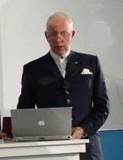Tony Buzan
Tony Buzan | |
|---|---|
 | |
| Born | Anthony Peter Buzan 2 June 1942 Palmers Green, Middlesex |
| Website | |
| www | |
Anthony "Tony" Peter Buzan (/ˈbuːzən/; born 2 June 1942) is an English author and educational consultant.
Buzan popularized the idea of mental literacy and a thinking technique called Mind Mapping,[1] earlier used by Leonardo da Vinci and others.
Background
Buzan was born in Palmers Green, Enfield, Middlesex. He is an alumnus of Kitsilano Secondary School in Vancouver, where he was Head Boys' Prefect 1959-60. His brother is the academic Barry Buzan. He is a promoter of mnemonic systems and mind mapping techniques. He launched his own software programme to support mind mapping called iMindMap in December 2006. The Buzan Organisation holds trademarks on the phrase 'mind map' in the context of self-improvement educational courses in the UK,[2] the USA[3] and Germany.[4] The trademark does not appear in the records of the Canadian Intellectual Property Office.[5]
Following his 1970s series Use Your Head for the BBC, many of his ideas have been set into his series of five books: Use Your Memory, Master Your Memory, Use Your Head, The Speed Reading Book and The Mind Map Book. He has since authored or co-authored over 100 books that have appeared in 30 languages.[citation needed].
As a popular psychology author, Tony Buzan has written on subjects relating to the brain, "genius quotient (GQ)", spiritual intelligence, memory, creativity and speed reading. He is the founder and President of the Brain Foundation (not to be confused with various medical-related bodies with the same name) and also the Brain Trust Charity, the World Memory Championships[6] and the World Championships of the Brain. He was a co-founder of London's Mind Body Spirit Festival as well as the Mind Sports Olympiad.[7]
Critics have called mind mapping pseudoscience, questioning the existence of evidence supporting the technique and the usefulness of mind mapping.[8]
Bibliography
- Spore One - Structure in Hyperspace (September 25, 1972) ISBN 0-85115-016-0
- Use Your Head (January 1974) ISBN 0-563-10790-1
- Speed Memory (January 27, 1977) ISBN 0-7153-7365-X
- Make the Most of Your Mind (February 1984) ISBN 0-671-49519-4
- Speed Reading (20 May 1971) ISBN 0-7221-2119-9
- Use Your Perfect Memory (Plume Penguin Group January 1991) ISBN 0-452-26606-8
- The Mind Map Book (6 September 1993) ISBN 0-563-36373-8
- Concordea (December 2006)
- Requiem For Ted (December 2006)
- Use Your Memory, (BBC Publications)ISBN 1-4066-1018-6
- Master Your Memory, (BBC Publications)ISBN 1-4066-1022-4
- The Memory Book, (BBC Publications, 2010)ISBN 978-1-4066-4426-5
- Mind Maps for Business, (BBC Publications, 2010)ISBN 978-1-4066-4290-2
- Brain Training for Kids, (Proactive Press, 2012) ISBN 978-1-908934-00-0
- The Most Important Graph in the World (Proactive Press, 2012) ISBN 978-1-908934-01-7
- Modern Mind Mapping for Smarter Thinking e-book (Proactive Press, March 2013)
References
- ^ Mind Mapping ™, Developing your ideas, Information Skills for Researchers
- ^ http://www.ipo.gov.uk/tmcase/Results/1/UK00001424476 Mind Maps Trademark, UK
- ^ http://tess2.uspto.gov/bin/showfield?f=doc&state=4801:4qhaee.2.17 Mind Maps Trademark, USA
- ^ https://register.dpma.de/DPMAregister/marke/register/2015931/DE Mind Maps Trademark, Germany
- ^ Canadian Intellectual Property Office
- ^ World Memory Championships
- ^ About Us, World Memory Sports Council
- ^ Pseudoscience and mind mapping, WikIT, the mind mapping wiki
External links
- Open2.net Biography OpenLearn/Open University.
